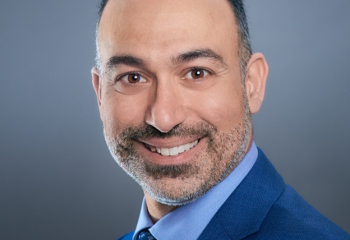Investing in the future of nursing with climate and health education

Dr. Stephen Ferrara, DNP, NP
As a family nurse practitioner, ivy league program administrator, and professor, Dr. Stephen Ferrara wears many hats – all of which he wears while affecting change. Finding few nursing-centered resources to use in educating his students about the health impacts of climate change, Ferrara led the Columbia University School of Nursing in becoming an official partner of the Nurses Climate Challenge School of Nursing Commitment.
When Dr. Stephen Ferrara, a primary care family nurse practitioner and the associate dean of clinical affairs at Columbia University School of Nursing, stumbled upon the Nurses Climate Challenge on Twitter, he followed the account right away.
“It was the first time I saw climate change and nursing together,” Ferrara shares. “I thought it was utterly fantastic something like that existed.”
After finding few nursing-centered resources to use in educating his students about the health impacts of climate change, he led the Columbia School of Nursing in becoming an official partner of the Nurses Climate Challenge School of Nursing Commitment. As a faculty member wearing many hats, Ferrara appreciated “having a turn-key solution with materials already prepared and slide decks ready to go.”
The Columbia University School of Nursing was the eleventh nursing school to join the School of Nursing Commitment, which launched in 2020. The commitment offers faculty the opportunity to use ready-made Nurses Climate Challenge resources to teach their students about the health impacts of climate change.
Ferrara presented an overview of climate and health impacts using the Nurses Climate Challenge ready-made PowerPoint to 150 of his Doctor of Nursing Practice (DNP) students in Columbia University’s graduate nursing health policy course. Like many faculty during the COVID-19 pandemic, his course has been delivered remotely using video conferencing. He developed a three item survey that was administered live at the outset of the Zoom session to ascertain students’ attitudes and beliefs about climate change and health. Ferrara encouraged students to write their own letter to the editor or opinion editorial about climate and health policy, integrating information about the House Select Committee on the Climate Crisis. The presentation was overwhelmingly well received, and some students suggested forming a student group around climate change and health. Ferrara plans to work with these students during the upcoming semester.
Through Ferrara’s efforts, Columbia University’s School of Nursing is doubling down on their efforts to invest in the future. The school is arming their students with the knowledge and skills to care for a population with increased exposure to the health impacts of climate change. Considering how issues like extreme heat, air pollution, volatile weather, vector borne diseases, and negative mental health impacts will lead to sicker patients and an increased burden on our health system, Ferrara emphasizes that policy is a holistic intervention to his students.
He shares, focusing on climate action is a “great way to weave policy into nursing because we have the numbers. If there were going to be a profession to bring climate to the forefront, I think that nurses are very well capable of making change.”
Ferrara’s commitment to climate and health started far before he found the Nurses Climate Challenge on Twitter. Having worked in New York City his entire career as a family nurse practitioner, he highlights the summer as a particularly poignant time for his patients.
“When the heat increased, I knew my patients with asthma were going to be more vulnerable than those who didn’t have compromised lung function,” Ferrara says. “I would reach out to those patients with asthma or COPD and make sure they had access to a cooling center or air conditioning, and that they would stay indoors during really hot days. I would make sure they had enough medications so if they had an asthma attack they could handle it without going to the emergency room.”
Ferrara knew this approach was aimed at helping the individual. As a provider, he has about 30 minutes to spend with each patient.
“We’re dealing with issues that are not solvable in 30 minutes. We are trying to work within the system,” Ferrara says. “It’s frustrating that a lot of things we do in health care are related to reimbursement. We are reimbursed for office visits, but health care doesn’t take place in an office visit.”
This framework has led Ferrara to ask: “how can I do something at a population scale rather than an individual scale?”
As someone who aims to address population health from a holistic view, Ferrara believes that what we teach students and how we teach students will deeply impact the future of the nursing profession. Providing an additional lens for nursing students to look through when it comes to climate change and health – and even racism in health care – will better prepare them in their careers.
“Teaching students is a great way of investing in the future of the nursing profession,” Ferrara says.
Stephen Ferrara lives in White Plains, New York. He met his wife, also a nurse practitioner, in nursing school. The Ferrara’s have three children who keep the family busy. Stephen loves being outside, gardening, and “just trying to experience the world” in whatever way he can.
If you are interested in learning more about how your school of nursing can join the Nurses Climate Challenge School of Nursing Commitment, visit our webpage and fill out an interest form today.
